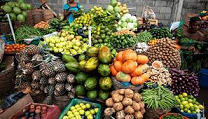Nigeria, Africa’s most populous country, is facing a critical challenge that has far-reaching implications for its future: food security. Despite having vast arable land and a climate conducive to agriculture, Nigeria is grappling with significant food insecurity issues that threaten the well-being of its population and the stability of its economy. With a rapidly growing population projected to reach 400 million by 2050, the demand for food will only increase, making it imperative for the country to invest heavily in its agricultural sector and food security infrastructure.
Currently, Nigeria’s food security situation is precarious. The country ranks low on global food security indexes, reflecting severe challenges in food availability, affordability, quality, and safety. Over 19 million Nigerians are estimated to be food insecure, and this number is likely to rise if current trends continue. The agricultural sector, which employs over 70 per cent of the country’s workforce, suffers from low productivity due to a lack of modern farming techniques, inadequate infrastructure, poor access to credit, and systemic inefficiencies in the supply chain. As a result, Nigeria is heavily reliant on food imports to meet domestic demand, spending billions of dollars annually on staples like rice, wheat, and fish. This dependency not only drains foreign exchange reserves but also exposes the country to global market fluctuations and supply chain disruptions.
Investing in food security is not just an economic imperative for Nigeria; it is a matter of national security. The country’s fast-growing population and rapid urbanisation are increasing the pressure on food supply chains, which are already strained. Without significant investments to boost domestic food production, Nigeria risks facing widespread food shortages, which could lead to higher prices, increased poverty, and social unrest. The link between food insecurity and conflict is evident in the northern regions of Nigeria, where competition over scarce resources has fueled violence and insurgency. By addressing food security, the government can help mitigate some of the underlying causes of these conflicts, promoting stability and peace.
Moreover, food security is crucial for economic diversification. Nigeria’s economy is heavily reliant on oil exports, making it vulnerable to global oil price fluctuations. Agriculture, if properly developed, offers a viable alternative revenue stream that can contribute significantly to the country’s GDP. Investing in agriculture not only creates jobs but also stimulates rural development, reduces poverty, and lessens the country’s dependence on volatile global markets. The potential for growth in this sector is enormous, but it requires targeted investments in infrastructure, research and development, and capacity building for farmers.
Climate change poses an additional threat to Nigeria’s food security. The country is already experiencing the impacts of climate change, including erratic rainfall, flooding, and desertification, all of which affect agricultural productivity. Investing in climate-smart agricultural practices is essential to building resilience against these changes. This includes the adoption of drought-resistant crop varieties, improved water management systems, and sustainable land use practices. Such investments would not only safeguard Nigeria’s food security but also contribute to global efforts to combat climate change.
To achieve food security, Nigeria must also address the structural issues within its agricultural sector. Access to finance is a significant barrier for many farmers, particularly smallholders who form the backbone of Nigeria’s agricultural workforce. Without affordable credit, these farmers cannot invest in the tools and technologies needed to increase their productivity. The government and financial institutions must work together to create financial products that cater to the specific needs of the agricultural sector. Additionally, reforms in land tenure systems are necessary to provide farmers with secure land rights, encouraging long-term investments in agriculture.
Policy reforms are equally critical. The government should prioritise food self-sufficiency by supporting local production through subsidies, tax incentives, and infrastructure development. Import substitution strategies can also help reduce Nigeria’s reliance on foreign food products, conserving foreign exchange and boosting local industries. Education and capacity-building initiatives for farmers are essential to improving agricultural productivity. By providing training on modern farming techniques, sustainable practices, and climate resilience, the government can empower farmers to adapt to changing conditions and increase their yields.
The urgency of investing in food security in Nigeria cannot be overstated. The consequences of inaction are dire, with potential impacts on the country’s economic stability, social cohesion, and overall development. By prioritizing agriculture and food systems, Nigeria can not only feed its growing population but also build a more resilient and diversified economy. The time for decisive action is now, and the future of Nigeria depends on it.





